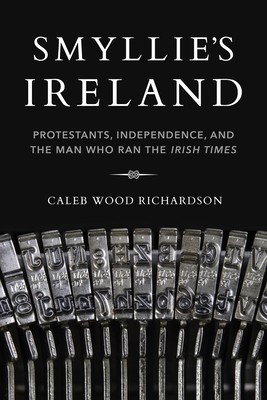
- We will send in 10–14 business days.
- Author: Caleb Richardson
- Publisher: Indiana University Press
- ISBN-10: 0253041244
- ISBN-13: 9780253041241
- Format: 15.2 x 22.9 x 1.1 cm, minkšti viršeliai
- Language: English
- SAVE -10% with code: EXTRA
Reviews
Description
As Irish republicans sought to rid the country of British rule and influence in the early 20th century, a clear delineation was made between what was "authentically" Irish and what was considered to be English influence. As a member of the Anglo-Irish elite who inhabited a precarious identity somewhere in between, R. M. Smyllie found himself having to navigate the painful experience of being made to feel an outsider in his own homeland. Smyllie's role as an influential editor of the Irish Times meant he had to confront most of the issues that defined the Irish experience, from Ireland's neutrality during World War II to the fraught cultural claims surrounding the Irish language and literary censorship. In this engaging consideration of a bombastic, outspoken, and conflicted man, Caleb Wood Richardson offers a way of seeing Smyllie as representative of the larger Anglo-Irish experience. Richardson explores Smyllie's experience in a German internment camp in World War I, his foreign correspondence work for the Irish Times at the Paris Peace Conference, and his guiding hand as an advocate for cultural and intellectualism. Smyllie had a direct influence on the careers of writers such as Patrick Kavanagh and Louis MacNeice, and his surprising decision to include an Irish-language column in the paper had an enormous impact on the career of novelist Flann O'Brien. Smyllie, like many of his class, felt a strong political connection to England at the same time as he had enduring cultural dedications to Ireland. How Smyllie and his generation navigated the collision of identities and allegiances helped to define what Ireland is today.
EXTRA 10 % discount with code: EXTRA
The promotion ends in 21d.22:12:28
The discount code is valid when purchasing from 10 €. Discounts do not stack.
- Author: Caleb Richardson
- Publisher: Indiana University Press
- ISBN-10: 0253041244
- ISBN-13: 9780253041241
- Format: 15.2 x 22.9 x 1.1 cm, minkšti viršeliai
- Language: English English
As Irish republicans sought to rid the country of British rule and influence in the early 20th century, a clear delineation was made between what was "authentically" Irish and what was considered to be English influence. As a member of the Anglo-Irish elite who inhabited a precarious identity somewhere in between, R. M. Smyllie found himself having to navigate the painful experience of being made to feel an outsider in his own homeland. Smyllie's role as an influential editor of the Irish Times meant he had to confront most of the issues that defined the Irish experience, from Ireland's neutrality during World War II to the fraught cultural claims surrounding the Irish language and literary censorship. In this engaging consideration of a bombastic, outspoken, and conflicted man, Caleb Wood Richardson offers a way of seeing Smyllie as representative of the larger Anglo-Irish experience. Richardson explores Smyllie's experience in a German internment camp in World War I, his foreign correspondence work for the Irish Times at the Paris Peace Conference, and his guiding hand as an advocate for cultural and intellectualism. Smyllie had a direct influence on the careers of writers such as Patrick Kavanagh and Louis MacNeice, and his surprising decision to include an Irish-language column in the paper had an enormous impact on the career of novelist Flann O'Brien. Smyllie, like many of his class, felt a strong political connection to England at the same time as he had enduring cultural dedications to Ireland. How Smyllie and his generation navigated the collision of identities and allegiances helped to define what Ireland is today.


Reviews